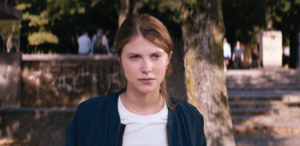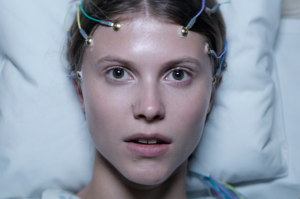‘Thelma’ is a Chilling, Hauntingly Beautiful Story of Discovery

Thelma (2017) opens with a startling and chilling scene that perfectly sets the stage for the unnerving, quietly powerful, and hauntingly beautiful story that is about to unfold. A man and a young girl walk through a frozen landscape, hunting. When they stop to shoot a deer, the man, standing behind the girl so she can’t see, points the gun directly at her head. The tension builds as you wonder if he’s actually going to shoot the child. However, apparently reconsidering, he puts the gun down. This palpable tension is exactly what you’re in for as you watch Joachim Trier’s suspenseful horror film that combines elements of romance with psychological, supernatural, and thriller to create a journey that leaves you on the edge of your seat.
Thelma tells the story of its title character during her time at university in Oslo. Thelma (Eili Harboe) has lived a sheltered life with her parents, who are very religious Christians. At school, she soon begins to experience unexplained seizures, along with a deep attraction to another woman, Anja (Kaya Wilkins). Thelma struggles a lot with her feelings for Anja, as they go against her religious upbringing. As time goes on and her desires get stronger, it soon grows clear that Thelma’s feelings for Anja (and her attempted repression of her feelings for Anja) manifest themselves in some way as supernatural abilities.

The story allows for a look at self-discovery as a whole in relation to Thelma’s unexplained powers, loneliness, sexuality, religion, and repression. The connection between Thelma’s supernatural abilities and the themes that the film explores is very interesting, as the abilities emerge with her feelings for Anja and manifest in the “worst” ways as she subconsciously tries to repress her feelings because of religious shame. However, once she learns the ultimate truth of what is happening to her, Thelma begins to gain more agency over herself and take back control over her life. Thelma starts the film confused, and goes on a journey of fear and uncertainty that ends with a much greater understanding and power over herself.
There are some truly haunting and stunning sequences in Thelma. One that stands out in my mind occurs about a third of the way into the film, when Thelma goes to see a performance with Anja and Anja’s mother. In the darkened theater, while an unusual dance performance begins, Thelma and Anja begin to connect physically, first by holding hands, which eventually starts to grow to more as Anja’s hand migrates to Thelma’s thigh. As this happens, Thelma’s hand begins to tremor, an above light fixture starts to sway, music builds, and you see bits of the slightly disturbing dance performance playing out on stage. Just as you wonder what will happen next—will Thelma begin to seize, will the light fixture fall?—the tension is broken by Thelma running from the theater. This and many other sequences throughout the film leave you almost holding your breath as you take in the strange beauty and question what is going to happen next.

One interesting element of the film is the fact that it uses very natural imagery, and Thelma’s unexplained powers and sequences related to them deal with natural objects. Birds fly in strange formations through the sky as Thelma’s abilities appear, a snake slithers into a mouth like desire into a body, water, ice, and fire are all shown as means of being trapped or gaining freedom.
The story is intrinsically tied to an exploration of sexuality, so the title character and the woman she falls for are both women-loving-women with undefined sexualities. This look at sexuality is tied to religious repression, but the woman ultimately get a happy ending together when Thelma realizes that she has agency over herself. While the film itself may not be the most groundbreaking, it includes LGBTQ+ representation that is rare.
I would highly recommend Thelma for a haunting, gripping film that you won’t soon forget about.

More to explore
By Same Author
Related lists created by the same author




